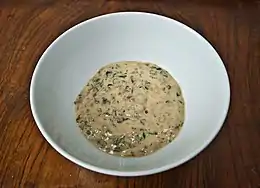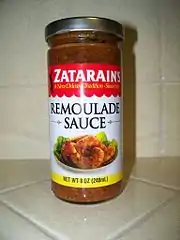Remoulade
Rémoulade (English: /reɪməˈlɑːd/; French: [ʁemulad])[1] is a European cold sauce based on mayonnaise. Although similar to tartar sauce, it is often more yellowish, sometimes flavored with curry, and sometimes contains chopped pickles or piccalilli. It can also contain horseradish, paprika, anchovies, capers and a host of other items. While its original purpose was possibly for serving with meats, it is now more often used as a condiment or dipping sauce, primarily for sole, plaice, and seafood cakes (such as crab or salmon cakes).

Use
Rémoulade is used in France, Denmark, Iceland, Faroe Islands, Germany, Sweden, Norway, Poland, and in the United States, especially in Louisiana Creole cuisine. It is often used with french fries, on top of roast beef items, and as a hot dog condiment, although there are a multitude of other applications:
- France: rémoulade is made from mayonnaise with vinegar, mustard, shallots, capers, chopped pickles, and/or fresh herbs (chives, tarragon, chervil, burnet).[2] It is commonly used in a dish called céleri rémoulade, which consists of thinly cut pieces of celeriac with a mustard-flavored remoulade, and also to accompany red meats, fish, and shellfish.
- Belgium: used often with fries, e.g., those sold at roadside stands. Also curry mayonnaise.
- Denmark: An essential ingredient on open-face roast beef sandwiches (smørrebrød) with roasted onion, as well as the Danish version of fish 'n chips, fried plaice fillets with a slice of lemon. It is also one of the essential condiments in a Danish hot dog (ristet med det hele) together with ketchup, danish mustard, chopped onions, fried onions, sliced dill cucumbers, and possibly also sweet American mustard. It is usually made with mayonnaise mixed with a purée of capers and gherkins or cucumber-(pickles), turmeric or curry, and sometimes cauliflower, cabbage and carrots.
- Netherlands: Often served with fried fish.
- Germany: Mainly used with fried fish, and as an ingredient of potato salads. In the southern half of the country it is served with boiled beef and potatoes.
- Sweden: Remouladsås or just Remoulade - is a common accessory to fried or breaded fish dishes, and used as topping on roast beef. The Danish version is also available and is used on a variety of dishes referred to as 'Danish-style', for example Danish hot-dogs, Danish smørrebrød, and suchlike.
- Norway: Primarily served with deep fried fish or aspic.
- Poland: Called remulada, or rarely sos duński (Danish sauce), it is a very popular condiment for fast food, such as hot dogs, hamburgers, or zapiekanka.
- Iceland: remúlaði is a condiment commonly served on hot dogs, together with mustard, ketchup, and raw and fried onions.[3]
- US: Typically served as a condiment with seafood and certain vegetables. Fried soft-shell crab sandwiches may be served with remoulade as the only sauce. It is also very commonly used as a condiment for sandwiches, especially turkey. Remoulade is most commonly paired with white cheese. It may be offered as a fry sauce as well.
- Louisiana Creole cuisine: Remoulade tends to have a tannish or pink tint due to the use of Creole brown mustard like Zatarain's, small amounts of ketchup, cayenne pepper, and paprika.[4]
Varieties
Sauce rémoulade
According to Larousse Gastronomique, rémoulade is 250 ml (1 cup) of mayonnaise with 2 tablespoons mixed herbs (parsley, chives, chervil and tarragon), 1 tablespoon drained capers, 2 finely diced cornichons and a few drops of anchovy essence (optional).[2] Some recipes use chopped anchovy fillets. The rémoulade used in céleri-rave rémoulade is not the same as the remoulades discussed in this article, but is instead based on a simple mustard-flavoured vinegar and oil dressing spiced with salt, pepper, and chopped green herbs.[5] Rémoulade is classified in French cooking as a derivative of the mayonnaise sauce.
Danish remoulade
Danish remoulade has a mild, sweet-sour taste and a medium yellow color. The typical industrially-made variety does not contain capers, but finely-chopped cabbage and pickled cucumber, fair amounts of sugar and hints of mustard, cayenne pepper, coriander and onion, and turmeric for color. The herbs are replaced by herbal essences, e.g., tarragon vinegar. Starch, gelatin or milk protein may be added as thickeners.
Homemade or gourmet varieties may use olive oil (especially good with fish), capers, pickles, carrots, cucumber, lemon juice, dill, chervil, parsley or other fresh herbs, and possibly curry.
In Denmark remoulade is mostly used for french fries, hotdogs and for open sandwiches with roast beef, salami, fish cakes or fried fish.
Louisiana remoulade

Louisiana remoulade can vary from the French-African Creole, the rustic Afro-Caribbean Creole, or the Classic Cajun version, and like the local variants of roux, each version is different from the French original. Creole versions often have tan or pink hues and are usually piquant. Louisiana-style remoulades fall generally into one of two categories—those with a mayonnaise base and those with an oil base, but sometimes both mayonnaise and oil are used. Each version may have finely chopped vegetables, usually green onions and celery, and parsley; most are made with either Creole or stone-ground mustard. Salt, black pepper, and cayenne pepper are also standard ingredients. In the oil- and mayonnaise-based versions, the reddish hue often comes from the addition of a small amount of ketchup and/or paprika.[6] The sauce is often topped with paprika for the aesthetics as well as the flavor. Generally, lemon juice or vinegar are added for acidity. Other additions include hardboiled egg or raw egg yolks, minced garlic, hot sauce, vinegar, horseradish, capers, cornichons, and Worcestershire sauce.[6][7][8]
While the classic white remoulade is a condiment that can be offered in a variety of contexts (e.g., the classic celery root remoulade), Creole remoulade is used on shrimp, crabs, fried calamari, artichokes, and fried green tomatoes among other foods. Today, shrimp remoulade is a very common cold appetizer in New Orleans Creole restaurants,[9][10][11][12] although, historically, hard boiled eggs with remoulade was a less expensive option on some menus. Shrimp remoulade is most often served as a stand-alone appetizer (usually on a chiffonade of iceberg lettuce). One might also see crawfish remoulade, but restaurants seldom offer remoulade sauce as an accompaniment with fish, where cocktail sauce and tartar sauce are generally preferred. However, food columnist and cookbook author Leon Soniat does suggest to "Serve [remoulade] over seafood or with sliced asparagus."[13]
Central Mississippi has comeback sauce, a condiment that is very similar to Louisiana remoulade.[14]
See also
Notes
- "dictionary.com – rémoulade". Retrieved 20 Feb 2016.
- Prosper Montagné (1961). Charlotte Snyder Turgeon; Nina Froud (eds.). Larousse gastronomique: the encyclopedia of food, wine & cookery. Crown Publishers. p. 861. ISBN 0-517-50333-6. Retrieved 16 April 2012.
- Hammel, Katie. "The One Dish to Eat in Iceland...Is Hot Dogs?". Conde Nast Traveller. Retrieved 25 June 2018.
- Bousel, Joshua. "Sauced: Louisiana Remoulade Recipe". Serious Eats. Retrieved 25 June 2018.
- Beck, Julia Child, Louisette Bertholle, Simone (1986). Mastering the Art of French cooking (Updated. ed.). New York: Knopf. p. 540. ISBN 0-394-72114-4.
- Martin, Ti Adelaide; Shannon, Jamie (2000). Commander's kitchen : take home the true tastes of New Orleans with more than 150 recipes from Commander's Palace restaurant. New York: Broadway Books. p. 91. ISBN 0-7679-0290-4.
- "Recipes - Galatoire's Restaurant". www.galatoires.com. Retrieved 12 October 2016.
- "Emeril Lagasse's New Orleans Shrimp Remoulade Recipe - Martha Stewart". YouTube. 26 February 2014.
- "Dinner Menu | Antoine's Restaurant". www.antoines.com.
- "Annunciation Restaurant Seasonal Menu | New Orleans, LA". annunciationrestaurant.com.
- "Menu | Original Pierre Maspero's". www.originalpierremasperos.com. Retrieved 10 October 2016.
- "K-Paul's Dinner Menu". K-Paul's Louisiana Kitchen. Retrieved 10 October 2016.
- Soniat, Leon E (1983). La Bouche Creole, p.61. Pelican Publishing.
- "Comeback Sauce Recipe | MyRecipes". MyRecipes.
References
- dictionary.reference.com
- Tulane University Newcomb College Center for Research on Women Deep South Culinary Oral History Project
- lib.k-state.edu, This page contains images of what may be the first recipe of remoulade in print from the 1817 edition of Le Cuisinier Royal.]
.jpg.webp)

